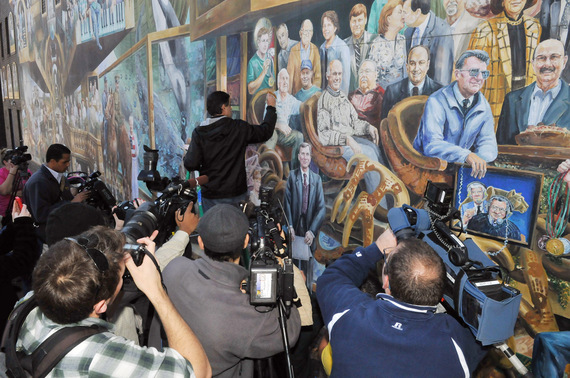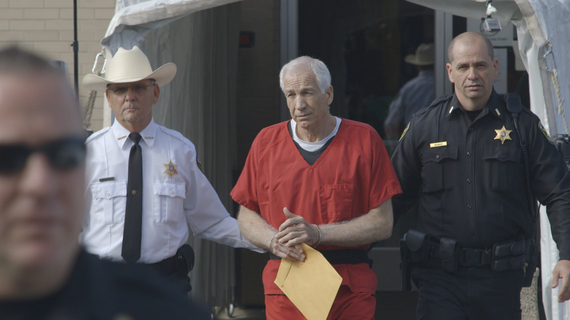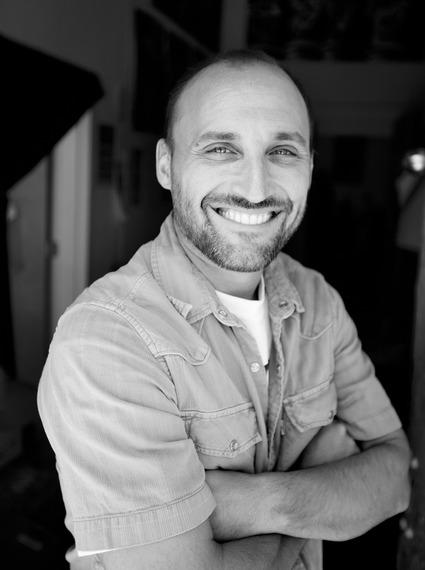
Credits: Pat Little
"In this town if you are religious and think God is the all mighty and all encompassing, you could put Joe Paterno in that realm and Jesus -- who is his son -- would be Jerry (Sandusky) and that is how it seemed in his town. The two most powerful people could do what they wanted and could do no wrong." - Matt Sandusky, adopted son of former Penn State assistant football coach and convicted pedophile Jerry Sandusky.
As sports figures are often relegated to the status of mythic God-like heroes, Matt Sandusky's observation is perhaps one of the most telling in the upcoming documentary Happy Valley (A&E Indie Films).
Opening in limited release on November 19th (Los Angeles and New York and video on demand), Happy Valley portrays the aftermath of Penn State University assistant football coach Jerry Sandusky's arrest on child sex abuse charges and the subsequent divide and damage to the community of State College (the home of Penn State University, also known as Happy Valley) one year later. Governed by the iconic head football coach Joe Paterno (known as "Saint Joe" to many) for 46 years, the university was heralded for its achievements both on and off the field -- a highly successful football program with an 85 percent graduation rate. It all came to a halt when Sandusky was convicted on 45 counts of child abuse, creating suspicion and doubt of who knew what and when as well as casting a pall over the entire university and town.
The 90-plus minute film is directed by acclaimed documentary producer and director Amir Bar-Lev (who produced The Tillman Story on Pat Tillman's controversial death by friendly fire and the 2009 Academy Award-nominated Trouble the Water). Ironically not a sports fan, the director majored in religion in college and drew correlations to the story. "We live in a symbolic world. People are always calling Pat a 'war hero' or Joe a 'surrogate father' and that says more about the people who call them that than the icon themselves," the director says. He feels that icons are very uncomfortable with their status, noting that Paterno never really wanted to be a "beacon of integrity" and correctly predicted people would place him on a pedestal and then knock him down.
The film opens against a backdrop of idyllic green hills, a sea of cars, barbeques and blue tents in "Nittanyville" where pre-game tailgating remains supreme and quickly cuts to June 2, 2012 as hordes of journalists and fans on the courthouse steps await news on the Sandusky trial.
Told through archival news footage (watching Sandusky frolic in the water with Second Mile kids is about as creepy as any horror film), interviews with the key figures -- Paterno, his widow Sue and two sons Jay and Scott -- along with students, fans, professors and even the town's Penn State muralist, Bar-Lev and his crew earned the trust of the community as he was not out to vilify but present the facts of the story. "I am very pleased and honored to do this film," the director says. "The film is not an investigative one -- I will leave that to the CNN's of the world." While not making excuses for the community, he explains, "At end of the day you can walk away and see a group of people who failed victims in a way they never knew -- they never knew serial pedophiles."
At the center of the film is the heartbreaking interview with Sandusky's adoptive son Matt who was plucked from the depths of poverty (he was brought up in a house with 15 children and no running water) and taken away by court order from his biological family (despite claims his birth mother says there was trouble with Sandusky). Desperately wanting to belong to a family and seduced by attention, gifts and privileges, Matt details, "Sandusky was the golden ticket in this town." After an epiphany during the trial that he knew "Victim Four," he changed his testimony about his own molestation.
If you are looking for answers, Happy Valley achieves what any great documentary does as it lets you draw your own conclusions. For viewers looking for definitive heroes and villains, Bar-Lev says, "Everyone has to decide for themselves. All 'take-aways' are equal. If I construct a 'take-away' it's not as liable to stick so I allow people to judge for themselves."
While the focus of culpability is on four key players -- Paterno, the school's ex-President Graham Spanier, ex-Vice President Gary Schultz and athletic director Tim Curley -- the issue of inflated football culture, idol worship and a "win at all costs" mentality plays an integral part.
The documentary begs many questions -- why didn't Paterno do more to stop the abuses? Was he a scapegoat or was he planning his exit the minute Sandusky was caught as rumored? Why rely on the administration to do the right thing? Why weren't the police notified? Where was child services? How thick were the blinders worn by the staff at Second Mile? And how much did media bias and sensational reporting play in this?
A finger can also be pointed indirectly at the NCAA. One has to wonder if this happened at Anywhere State U where football yielded no major financial revenue if that school would receive the death penalty. How do you levy the deathblow on SMU for bribery and not a university for lack of institutional control for trying to protect their revered football program? This is far worse than the academic fraud at UNC and the continuing look the other way disciplinary problems at Florida State -- this involved innocent children. As PSU film professor Matt Jordan says in the documentary, "How can the NCAA be shocked by the reverence of football when that is the thing their advertising campaign promotes? The NCAA makes 500 million a year because of the reverence of football."
Happy Valley is a must-see, a compelling objective documentary about the culture and climate of sports and heroes. It remains a polarizing debate that still divides. Bar-Lev's next venture is a documentary on the Grateful Dead (he muses, "I am going from one Jerry to the next"). Let's hope one of his future projects tackles the failings and hypocrisy of another almighty powerful institution, the NCAA.

Photo Credit: Courtesy of Asylum Entertainment

Director Amir Bar-Lev
Photo Credit: Brian Nevins